|
11th July to 4th
August
Syria – "Please tell Tony Blair"
Five days into Syria, at a
grazing stop in the village of Al Maharousa, a smiling man, Ghias,
came over for a chat. “How do you find the Syrian people?” he asked.
We told him our experiences of the previous five days: roadside
fruit sellers handing us peaches and apples as we passed; people in
cars winding down their windows and giving us bottles of cold water;
men rushing out of their houses to offer water for the horses;
families bringing us pots of tea at lunchtime; shopkeepers refusing
to accept payment for food; a man offering his house for a shower
and clothes washing; a woman insisting we stay at her house all
afternoon and night; people stopping their cars or motorbikes just
to ask if we needed any help.
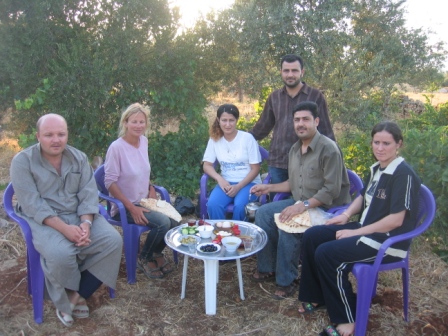 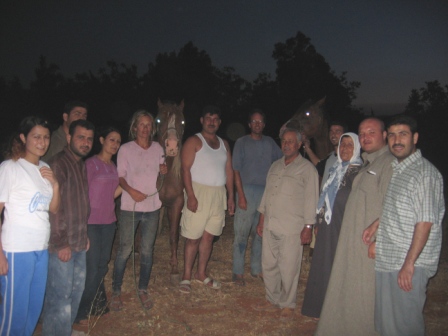
I could go on but there’s a problem.
I’ve banged on so much about the hospitality in other countries, how
can I possibly convince you that in Syria it’s on yet another,
higher level altogether? Why weren’t we prepared for this? Syrian
hospitality is legendary - Lisa had even experienced it before - but
somehow in our heads this knowledge had become buried and obscured
by more recent, media-fed inputs: Syria as a ‘rogue state’, Syrian
troops and spies in Lebanon, Syria ‘harbouring terrorists’, Syria
aiding insurgents in Iraq…a whole series of negative images. What’s
more, with Syria’s rightfully strong opposition to the war in Iraq
we thought there might be some resentment of Britain. But these
things are all to do with governments, our experience all to do with
people.
After relating these experiences to Ghias, he smiled even more. “Will you
please tell Tony Blair?” he asked. Later that evening, over a meal
with Ghias – and his brothers, sisters, brothers-in-law,
sisters-in-law, uncles, aunts, cousins, father, mother and assorted
friends – we were talking with Sami, who teaches English in the
local school. He would love to come to Britain but is afraid. He’d
heard that men are shot in London just for speaking Arabic, that
every Arab is considered a criminal there. Other than apologise,
there wasn’t much we could do about Blair but we tried to give some
reassurance that the British people aren’t all bad. We promised to
help Sami get a visa if we can. He’s studied Dickens and knows that
London is a foggy city. What a shame if he didn’t visit for fear of
being shot.
To enter Syria we’d chosen a quiet border post up in the Yayladag
mountains. But this didn’t prevent there being a Mr Big to report
to. I could tell he was Mr Big because his Mr
 Big office covered
about half an acre, his huge Mr Big leather swivel chair was set up
on a raised platform behind his colossal Mr Big desk and, although
no further clues were necessary, there was a polished gold plaque on
his door saying ‘Center President’. He wanted to know everything,
including how we intended getting the horses back to Britanya.
“Probably either ship or plane”, I said. “Ship is better,” replied
the President, “in plane there is no oxygen, this is problem for
horse”. Before he had time to start worrying that the horses might
just push us over our baggage allowance as well, I thanked him for
his advice, made my excuses and left. Big office covered
about half an acre, his huge Mr Big leather swivel chair was set up
on a raised platform behind his colossal Mr Big desk and, although
no further clues were necessary, there was a polished gold plaque on
his door saying ‘Center President’. He wanted to know everything,
including how we intended getting the horses back to Britanya.
“Probably either ship or plane”, I said. “Ship is better,” replied
the President, “in plane there is no oxygen, this is problem for
horse”. Before he had time to start worrying that the horses might
just push us over our baggage allowance as well, I thanked him for
his advice, made my excuses and left.
A couple of hours later the vet arrived and looked over our horse health
paper. All we’d been able to get from Turkey was a one paragraph
letter in Turkish. Lisa had found a translator who gave us a copy in
Arabic but not English; we had no idea what it said. The vet spoke
some English and he was able to enlighten us: “Horses very healthy
with no tumours.” Marvellous. The vet knew this didn’t exactly
amount to an official health certificate but he was, as we say in
Wales, ‘a tidy bloke’ so it was all smiles and we were in. Just
after the border we were overtaken by a tour bus with blackened out windows and a giant slogan on the side: “See Life of World in Real
Eyes.” Oh well, there’s always next year. For now we’ll have to
settle for seeing it through real ears (chestnut and hairy).
windows and a giant slogan on the side: “See Life of World in Real
Eyes.” Oh well, there’s always next year. For now we’ll have to
settle for seeing it through real ears (chestnut and hairy).
We spent our first few Syrian days more or less lost in the Jebel an
Nusayriyah mountains. The hurdle of another border had been jumped
and now we had the good prospect of having a whole new country ahead
of us. But things just weren’t the same without Audin. He’d carried
Lisa for 5,000 miles and now he was gone she was missing him…badly.
Hannah was going well but she wasn’t Lisa’s horse, she wasn’t her
Audin. We’ve had good times and hard times all along but now the
good weren’t as good because Audin should have been there to share
them and the hard were, well, just harder, harder to deal with.
After a lunchtime summit meeting under a huge fig tree, we agree to
continue at least as far as the Krak des Chevaliers and from there
either head west to the coast at Tartus where we’d heard there was a
ferry to Cyprus or, if we felt any better, carry on south as
planned.
Talking of planning, how is it that we managed to find ourselves crossing
the Carpathians and Balkans in the depths of winter and now, now
it’s the middle of July,
 we’ve ended up in Syria? It takes years of
preparation to plan things as cunningly as that. The heat meant a
change of routine. Now we were rising at five, getting going as soon
as possible, crashing out under a tree from midday till about three
or four, then carrying on for a couple of hours in the more
civilized evening temperatures. Staying up late talking with our
hosts meant that a lunchtime siesta was now compulsory to avoid
building up a sleep deficit. This was just fine by me, and even
accepted by Lisa, providing we took it in turns so one of us could
keep an eye on the mares. The important thing in these situations
is, on waking up, rubbing eyes etc, to vigorously deny having
actually had any real sleep and dismiss as utter nonsense any claims
that snoring had been heard and that people who are awake don’t
snore. we’ve ended up in Syria? It takes years of
preparation to plan things as cunningly as that. The heat meant a
change of routine. Now we were rising at five, getting going as soon
as possible, crashing out under a tree from midday till about three
or four, then carrying on for a couple of hours in the more
civilized evening temperatures. Staying up late talking with our
hosts meant that a lunchtime siesta was now compulsory to avoid
building up a sleep deficit. This was just fine by me, and even
accepted by Lisa, providing we took it in turns so one of us could
keep an eye on the mares. The important thing in these situations
is, on waking up, rubbing eyes etc, to vigorously deny having
actually had any real sleep and dismiss as utter nonsense any claims
that snoring had been heard and that people who are awake don’t
snore.
At times we’d be woken even earlier than five. The mosque in the village
of Dweezah possesses the Arab world’s loudest loudspeaker system –
it’s possible that the volume control had once jammed on its maximum
setting and nobody had ever been found who could fix it. Maybe it
was just because we were camping right under the minaret. At four
thirty a.m. “Allah hu akbar etc” at five hundred megadecibels killed
off any chance of further sleep. But we forgave the man behind the
voice when he popped out later on with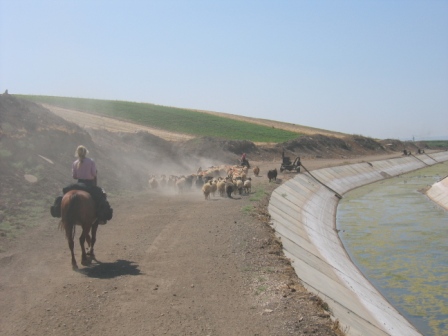 a pot of delicious coffee for
us. It’s strange but the familiarity and routine of the muezzin
(call to prayer) becomes quite comforting after a while. a pot of delicious coffee for
us. It’s strange but the familiarity and routine of the muezzin
(call to prayer) becomes quite comforting after a while.
A long steep drop out of the mountains landed us on the broad plain of Al
Ghab. The hills beyond are red earth dry but the plain is packed
with crops, watered by the Orontes River. We rode along the banks of
irrigation canals where Bedouin families camped and grazed their
sheep and goats on the stubble. A shepherd ran over to us, pointing
at Sealeah and asking “aseel? aseel? (purebred?)” “Yes,” we
answered, and then, pointing to Hannah “and she’s half aseel.” From
here onwards, this conversation was to be repeated several times a
day.
We felt a tiny bit sorry for Hannah only being a ‘half’ and Sealeah, like
the princess that she thinks she is, getting all the praise. Farmers
across Europe had admired Hannah for her greater power and obvious
rear-end strength (i.e. fat arse) but here it was Sealeah’s classic
Arabian beauty that struck a chord. Both of them trace back in
several lines to horses bred in the Syrian desert and bought by the
Blunts (founders of the famous Crabbet Arabian Stud) at the end of
the nineteenth century. It may be over a hundred years since horse
breeding declined among the desert tribes but after thousands of
years of partnership the memories clearly don’t die easily.
Halfway down Al Ghab we reached the ruins of the ancient city of Afamea
and decided to stop for a half day rest and soak up the atmosphere.
The place is all open and we were allowed to camp behind a café bang
in the middle of the site. The main feature is a two kilometre long
colonnaded street running north to south, a street which Anthony and
Cleopatra once travelled on their way back from some
Armenian-bashing up north. But despite all the history we will
always remember this place for one thing above all others: The Great
Fire of Afamea.
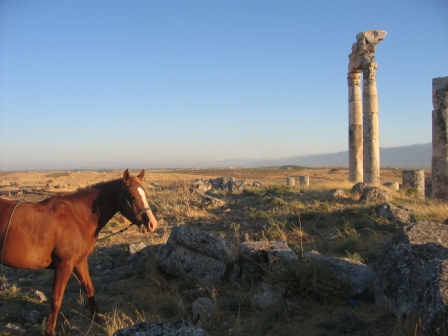 
We had finally sat down after a couple of hours of setting up camp,
making a safe pen for the horses and getting food supplies from the
village. We smelt smoke but assumed it was just a controlled fire,
someone burning rubbish maybe. But very rapidly, the smoke became
thicker and started stinging our eyes. A man came running from
behind the building, shouting that we must move. In seconds flames
appeared round the corner and reached the edge of the horses’
electric pen – a strong gusty wind was blowing the fire through
parched dead grass at frightening speed. The fire had been going on
behind us and the high wall had kept it hidden from view. Lisa
immediately led the horses away to safety but the next few minutes
for me were just a blur of flames and smoke and panic as I
desperately tried to rescue our tent, saddles, saddlebags, clothes,
all our precious equipment.

Our camp was against the outer wall of a courtyard and just around the
corner of the wall was out of the wind and safe from the flames.
Each run to grab a saddle or a bag became harder as the heat and
smoke intensified. All our money, passports and papers were in the
tent but the tent had been tied tightly to the wall due to the
strong wind. With the flames only yards from the tent there was no
time to fiddle with knots. I pulled but it wouldn’t budge. Now I was
really worried and the heat was unbearable. I pulled harder, poles
snapped, fabric ripped but at last the guy ropes gave way and the
tent came free. I ran to safety, dragging it behind me and bent over
coughing, lungs burning. Some things were still left behind but now
it was too late, in a matter of minutes the fire had burned out our
whole camp area.
  
When the last flames had finally been extinguished, I assessed the
damage: tent poles snapped and fabric torn, all Lisa’s spare clothes
burnt, collapsible water buckets melted into goo, Sealeah’s numnah
melted, electric fence burnt and poles bent. Virtually everything
else was UHT (ultra heat treated) but remarkably there was no other
serious damage. I had singed hair on my head, eyebrows and arms and
my fingers were burned from pulling the hot nylon guy ropes. I went
over to find Lisa. The horses were oblivious to it all and calm as
anything; they thought they’d just been led out for a graze. I
couldn’t understand why I wasn’t feeling more annoyed about the
damage but Lisa voiced what we were both thinking: the horses were
safe, what else mattered? Compared to losing Audin, this was just a
minor hiccup.
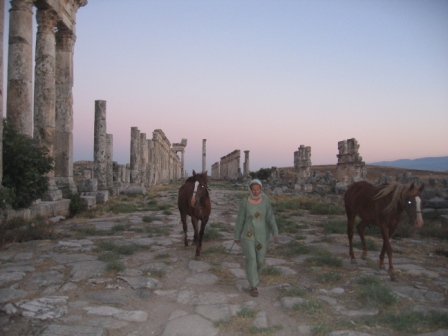  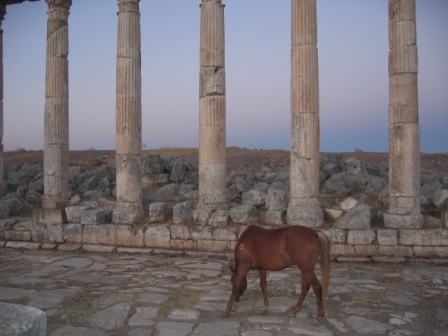
At sunset we rode Hannah and Sealeah around the ruins of Afamea, down the
full length of the main street from the Antioch Gate to the Damascus
Gate. In the beautiful evening light we had the whole place to
ourselves. The city had once been famous for its horses: thirty
thousand mares and three thousand stallions. The grazing must have
been a lot better two thousand years ago because now there were only
two horses here and they weren’t impressed by what was on the menu.
Sealeah kept nibbling at whatever she could find but Hannah was just
disgusted. It was no use telling her that she was in the ‘Fertile
Crescent’; she couldn’t see any proper green grass and that was
that. Their staple diet had now become straw and barley - mixed up
to become strawley – this was usually all we could find. Presenting
them with another bucket of this unappetizing stuff, we could sense
the disappointment. Where they come from straw is for shitting on,
not eating - perhaps it’s like asking us to tuck into a plate of
Kleenex. To spice it up a bit we add oil, bread and apples and
Sealeah helps herself to anything I try and sneak into my mouth as
we walk along. Remarkably, this diet has kept them going well and
they stayed in excellent condition, so much so that many people
asked us if they were in foal.
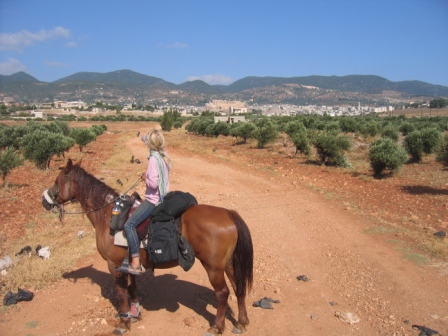  
A day’s ride from Afamea took us to Al Mahourousa where Ghias had met us
on the roadside and put us up for the night. He said that we were
the first English speakers to visit his house and would probably be
the last. His father wanted us to stay for a week. But we had to
move on so we continued south, past the Assassins’ fort at Misyaf
and back up into the hills again to reach the Krak des Chevaliers, a
spectacular crusader castle. The ‘Krak’ has been described as the
finest castle in the world and it’s certainly hard to imagine a
better one. The famous Saladin never managed to capture it and a
small band of crusaders hung on here to the bitter end, long after
Jerusalem had been retaken. After a few days rest camped beneath the
castle walls we were ready to carry on south. We’d almost forgotten
that we’d considered turning back from here; the incredible Syrian
friendliness and hospitality had given us a huge morale boost.
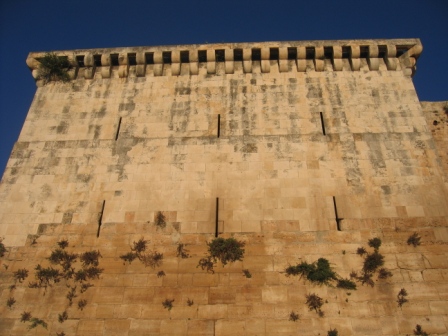 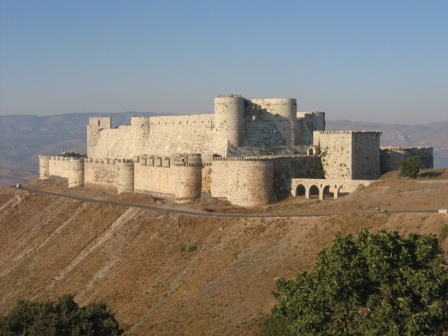 
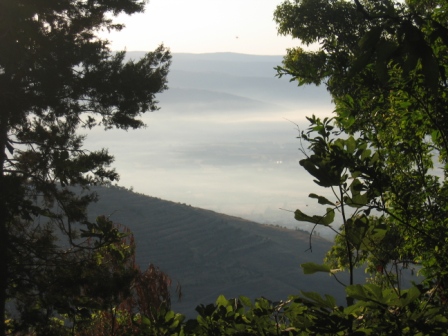 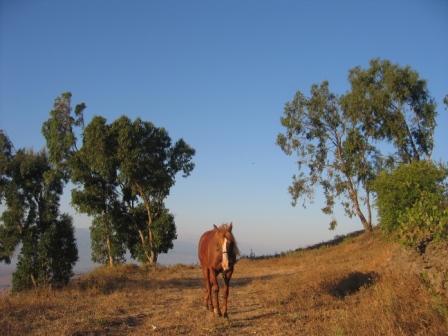
  
We couldn’t head due south, however, because a large lump of Lebanon lay
in the way. Unfortunately we cut it a bit fine skirting the border
area and had what is known as ‘a bit of a run-in’ with the
police…and the army. You have to be careful with Syrian maps because
they tend to show international borders where the government would
like them to be, rather than the inconvenient detail of where they
actually are. But this wasn’t the problem here, we were just
something different for the men in uniforms to get excited about. It
started mid-afternoon when an army truck stopped to check our
passports and hear our life story. Then there was a long wait at a
police checkpost while an officer appeared to be really struggling
to decipher our passports. After ten minutes Lisa put him out of his
misery by telling him he had them upside down. Another hour later we
reached yet another army post and another forced stop for passport
scrutinization. By now we’d had enough so we stopped at the next
house and asked where we could buy ‘tibin (straw) and sha-ir
(barley).’ An hour later we were nicely settled in the back garden
of the barley man’s house, having several cups of tea and discussing
international terrorism (as you do).
 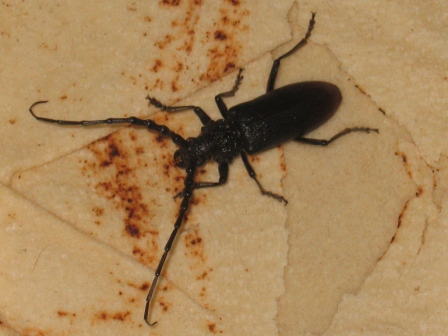
And then the soldiers arrived. They explained that their commanding
officer wanted to see our passports. “But we’ve shown them three
times today already!” Resistance was futile. I wasn’t happy to let
the soldiers take the passports so I had to go with them. Machine
guns were waved at a passing minibus – quite an effective hitching
technique – and forty five minutes later I was sitting in a tiny
concrete shed somewhere on the Lebanese border. Across the desk was
a grinning army officer. He did glance at the passports of course
but the real reason for dragging me out here was to practice his ‘inglizi’,
namely the numbers one to ten, hello, good…bye and good morning. But
my good morning had been a long time ago and now it was becoming a
bad evening. It was ten o’clock at night and I couldn’t stop
yawning. I was about to say “Please can I go home now?” when the
officer started writing something very carefully on a piece of paper
and pushed it over the desk to me. I read it out: “If the length of
the pendulum changes…”
Blimey! Where did that one come from? One minute we’re in Sesame Street
counting to ten, the next we’ve moved on to the laws of physics. He
was immensely proud of himself for remembering this but was very
keen for me to finish off the expression for him. “If the length of
the pendulum changes…err…it’s time to let the tourist go?” I
suggested hopefully. He shook his head. No, that wasn’t it, try
again. Just then the coffee arrived – two millilitres each and
tasting predominantly of soap – and, almost simultaneously, so did
the jeep that had been called to take me back. All talk of pendulums
was immediately forgotten and between saying “Good…Bye!” about ten
or fifteen times, the officer was all beaming smile and vigorous
not-letting-go-for-uncomfortably-long-period handshaking.
 
Back at the house, where Lisa was having an interesting conversation with
a woman who had twenty kids, things were just getting back to normal
after a police visit. A worried looking policeman had spent the last
hour following Lisa around the house and yard with his machine gun,
clearly terrified that he’d stumbled on something serious. Not least
among his concerns was the fact that Lisa didn’t have a passport to
show him. She tried to explain that not only had our entire
afternoon been devoted to passport-showing but also, at this very
moment, her husband was doing even more passport-showing with the
army somewhere. None of this helped much until the Big Police Chief
arrived, apologised profusely and promised that he’d inform every
police post between here and Damascus so we’d never have to
passport-show again.
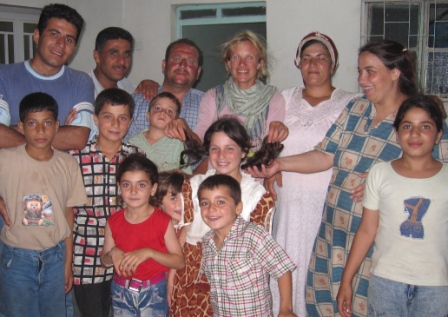 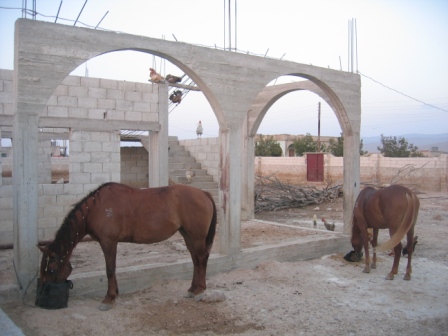 
A few days later, somewhere not far from the Homs to Damascus highway, we
were sitting under some trees sheltering from the midday sun. We
were quite pleased with ourselves for finding such a good hiding
place and confident of getting some top quality siesta shut-eye,
when a man on a motorbike came slaloming through the trees. “Hi, I’m
Mohammed and I’m going to be your plain-clothes police spy for
today!” Okay, those weren’t his exact words but it was the general
idea. Mo was a particularly friendly spy. He showed us a nearby
hosepipe that was irrigating some fruit trees and kindly held it
over my head thus rinsing out a few kilos of desert dust. He even
brought us each a bottle of Fanta, complete with straw. A few hours
later, back on the road, I noticed him sitting on his bike, a tiny
dot silhouetted on the hillside above us. I waved and he waved back.
What a nice, friendly, Syrian plain-clothes police spy he was!
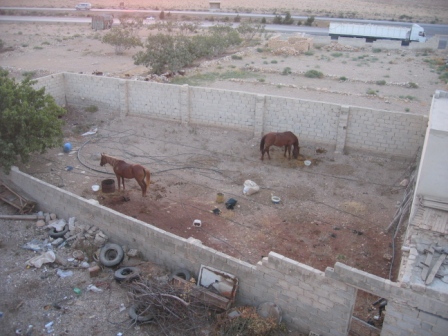  
Lisa was convinced that Mohammed’s presence was connected to her dealings
with Big Police Chief a few nights earlier. “He’s not a spy, he’s
protecting us,” she protested. “Protecting us from what?” I
answered, “dirty hair and orangeade deficiency?” It was clear,
however, that our Mo was in a very different category from your run
of the mill, bog-standard village spy. We’d come across these
individuals nearly every day and it seems that they are generally
considered to be a complete pain in the backside. On our first night
in Syria, at the village of Rabi’a, a man approached me as I was
getting water from the mosque. He wanted to see my passport so I
asked to see his police ID. This he didn’t have and it wound him up
a bit. He followed me into a shop where I had the usual Q&A session
with the assembled clientele. After a while Village Spy couldn’t
contain himself any longer and butted in, demanding to know my and
“madam’s” names. Very carefully he wrote ‘h a r r y’ and ‘l i s a’
down in the shopkeeper’s exercise book and then tore out the page.
This unnecessary damage to a perfectly good exercise book greatly
annoyed the shopkeeper who then had a real go at Spy, stopping just
short of giving him a slap (this seems to be the preferred method of
combat in most arguments we’ve witnessed). We later observed a
similar level of respect accorded to many other village spies.
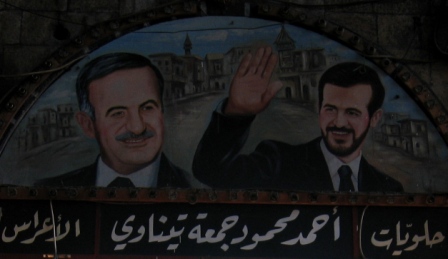
After
a couple of days heading south towards Damascus, we worked our way back
up into some hills. These were called the ‘Jibal Lubnan Ash Shaqiyeh’
on one of our maps and ‘Anti-Lebanon’ on the other. We thought it was
Lebanon that was anti-Syria but here was a whole mountain range
expressing nationalist rivalry. Nestled in a rocky gap in these hills
is the pretty village of Maalula, notable for being one of only three
remaining villages where Aramaic – the language spoken by Jesus – is
still in use.
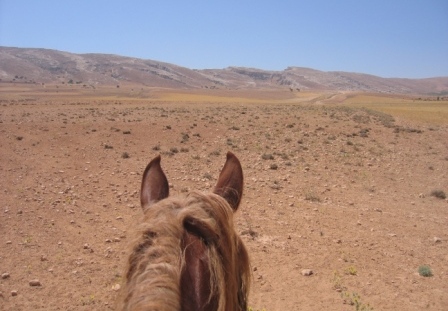 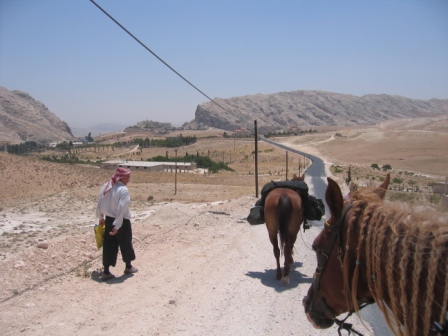
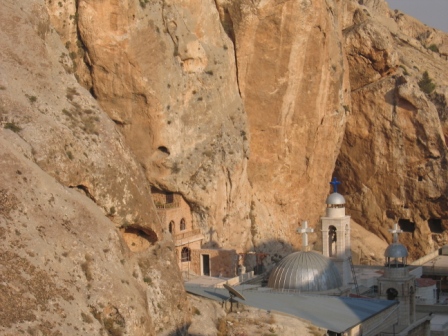  
 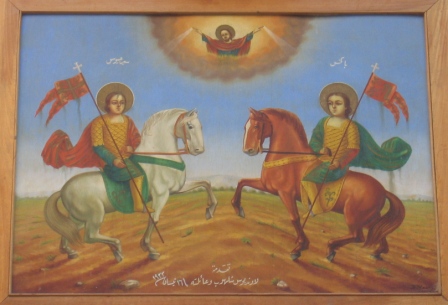
Here we stayed at an under-construction dairy farm which had just
acquired a few cows to get things started. The cowmen were speaking
Aramaic as first language and they taught us a few words. It sounded
very lispy (lithby) to us and tricky to follow. We then had a moment
of pure enlightenment. Of course! This must have been why Jesus’
“blessed are the peacemakers” from his sermon on the mount was
famously misheard as “blessed are the cheesemakers”! And later
interpreted by some scholars as not being intended to be taken in a
literal sense but to actually refer to all manufacturers of dairy
products. And to think, we’d made this startling discovery while
staying on a dairy farm in the holy land! How travel broadens the
mind.


Next stop after Maalula was Saydnayya, a Christian town with an imposing
convent built on a rock and no fewer than forty other churches to
choose from. Damascus was just a short hop away by bus so we took a
few days rest to get the ball rolling on horse health certificates
for Jordan. The highlight of Lisa’s day in Damascus was accidentally
walking into the Ba’ath Party Headquarters and not being allowed to
leave! Not until she’d been given a nice cup of coffee and had a
good chat with the friendly Ba’athists anyway.
 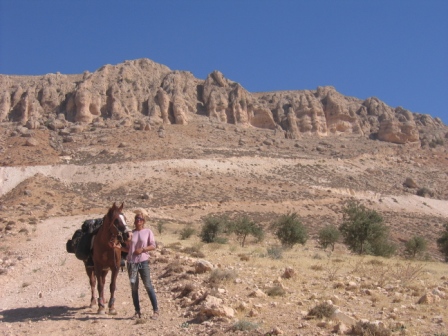 
We descended from Saydnayya into a hot dustbowl of quarries and
factories, highways and towns – not exactly idyllic riding country.
To make matters worse, the towns were full of screaming boys,
running along beside us. “Arabi aseel? (purebred Arabian)” they’d
ask, pointing at Sealeah. The shouts would then ripple back through
the ranks. “Arabi aseel arabi aseel arabi aseel!” Unfortunately all
the shouting and running and bikes and bodies darting about upset
the horses. Even worse, a stone would occasionally be thrown and
we’d have to stop and chase all the kids back.
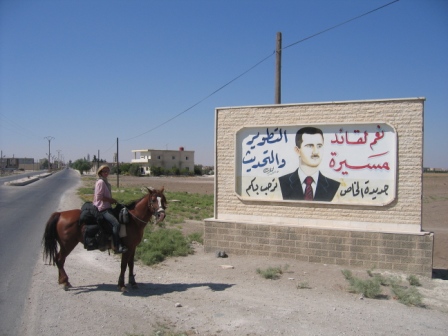  
 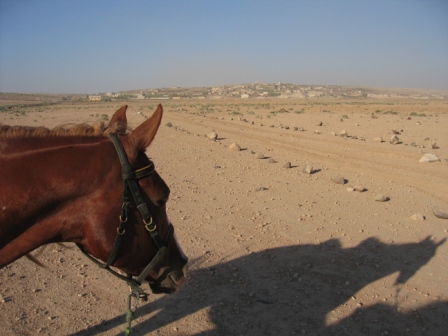 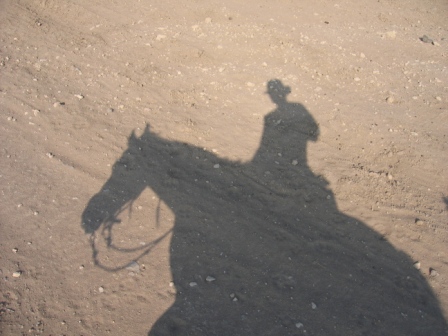
Luckily this area gave way to a much quieter region between Damascus and
the Jordanian border. It appeared to be one huge desert military
zone with camps and tanks, jeeps and soldiers everywhere. But the
tank tracks were firm and clear of rocks, giving us some superb long
canters. Our greater speed meant that all too soon, we found that
Syria was running out. On our last night we had a lively evening
with a woman, her seven young kids and as many people from the
surrounding Bedouin tents that could cram into the one room house.
The woman’s husband had recently died and she couldn’t prevent her
tears when she showed Lisa his photograph. But she and all her kids
were delighted that we were staying with them for a night. As always
in Syria we were made to feel as though we’d done them a big favour,
not the other way round. Is there a country on earth with friendlier
people than this?
 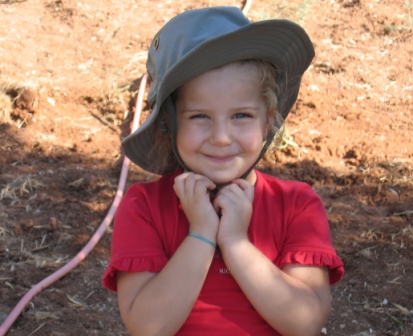
 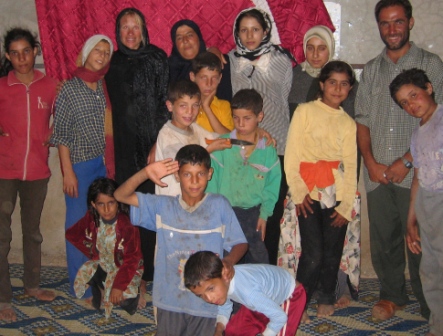 
Even all the ‘special’ police who stopped us nearly every day were
friendly. These gentlemen of the SARPD (Syrian Arab Republic
Political Department) were always happy to take down only our first
names, as long as we provided our mother and father’s names as well.
Across Syria, from north to south, there are now some thirty little
notebooks, each with a page that says “Harry John Gordon Judy Lisa
Rachel Peter Marly” (I particularly enjoyed hearing them repeat the
Marly). As long as they’re happy in their work, that’s the main
thing.
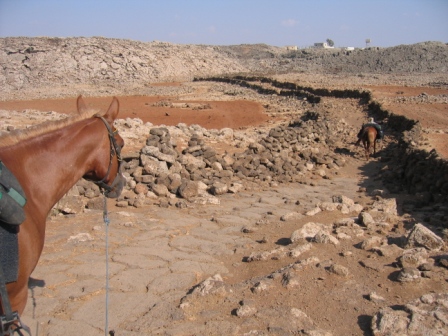  
 
At the border we were genuinely sorry to be having to leave. A final wave
to a final portrait of President Assad with his little moustache,
our passports inspected a mere five times within two hundred yards
and we were out in no-man’s land. I haven’t even mentioned the food,
the falafel and houmus, the fresh figs, the peaches, the apples for
10p a kilo. I haven’t mentioned the man who rode past on his
motorbike and shouted “Hellooooo Misterrr Jones, how you dooooooooo?”
I haven’t mentioned that everybody in Syria rides a motorbike; a
family of five on a bike is common but three persons per bike is
about average. (There’s only one thing more worrying than seeing a
five year old kid hanging on the back of a motorbike and that’s
realizing that it’s his six year old brother who’s driving.) I
haven’t mentioned that nearly everyone in Syria told us it was “Ooh,
very far!” to the next village on our map, despite having just found
out we’d ridden from Wales. I haven’t mentioned any of these things
because Syria’s finished, we’re already in no-man’s land and
Jordan’s just up there on top of the ridge.
 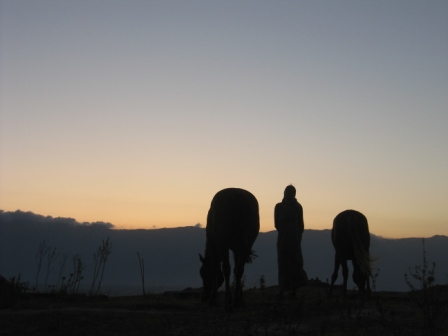
 |